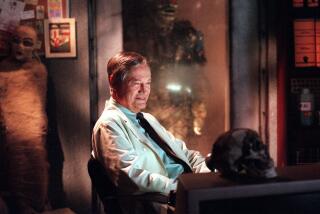T.E.B. Clarke, 81; Writer of Comedy Movie Scripts
- Share via
T. E. B. Clarke, who wrote many of the quiet comedies that came to typify the oeuvre of England’s legendary Ealing Studios, including one that won him an Oscar, “The Lavender Hill Mob,” has died of cancer. An obituary notice published in London on Monday said he was 81 when he died Saturday in a hospital there.
The scripts of Thomas Ernest Bennett Clarke (Tibby to his friends, a corruption of Tebby, which was a corruption of T. E. B.) were the benchmark of the Ealing tradition--a small production studio in suburban west London that now houses the British Broadcasting Corp. The comedies made there featured Will Hay, George Formby and a youthful Alec Guinness and they played to packed houses in the United States and Britain featuring, as they often did, an eccentric member of the underpaid and unappreciated minority rebelling against whatever authority had put him in that position.
In “Passport to Pimlico” (for which Clarke was nominated for an Academy Award in 1949), the residents of London’s Pimlico district discover they are part of France and declare themselves an independent state. “The Lavender Hill Mob” in 1951 had bank clerk Guinness robbing the Bank of England of its gold bullion. “The Titfield Thunderbolt” in 1953 showed country dwellers fighting to preserve their railway line.
Clarke said he went to the Bank of England for advice on how to rob it and filled out a form asking “Nature of Business.” He said the officials were very helpful and he used the method they showed him when he wrote his script.
Clarke wrote 14 films, including a police drama, “The Blue Lamp,” which later became a TV series, and John Ford’s only British film, “Gideon’s Day” (released in the United States as “Gideon of Scotland Yard”). He was nominated for another Oscar, in 1960 for adaptation of D. H. Lawrence’s “Sons and Lovers.” Clarke co-wrote eight other films and authored 15 books, mostly novels and his 1974 autobiography, “This Is Where I Came In.”
Clarke worked in advertising and journalism and was in the London police force before turning to films. He had written several of his novels as a youth and, as he told The Times in a 1962 interview, “film people are always more impressed.” That was how he broke into pictures, he said. “Because they could say I was an author.”
More to Read
The biggest entertainment stories
Get our big stories about Hollywood, film, television, music, arts, culture and more right in your inbox as soon as they publish.
You may occasionally receive promotional content from the Los Angeles Times.









